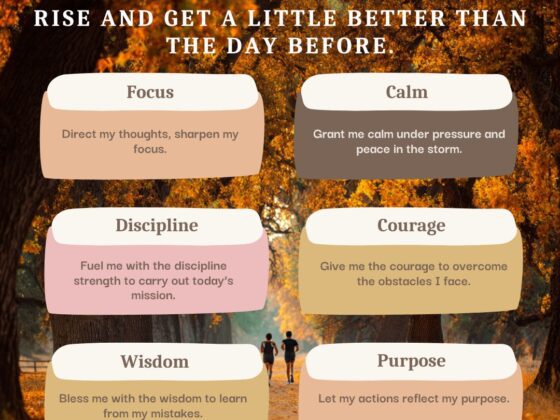First, I only consider myself a high performer in some cases. I am working to become a more consistent high performer. I have a successful career, work hard, and lead people at the office. I am on a continuous journey to become a better dad and man.
There are probably many lists like this, and they would apply to anyone. It is a list I recently presented to my leadership team at work.
A high performer gets things done. They can persist through any challenge. They are known for completing work quickly. High performers are trusted members of the team. They say what they do and do what they say.
A high performer is self-aware. They know their strengths and weaknesses, understand what steps they need to take to adjust their shortcomings, and know how to leverage their strengths to benefit the team or their family. They understand the time it takes to get work completed. The understand their limitations but also look to challenge and grow beyond their limitations.
Knowing others is intelligence; knowing yourself is true wisdom. Mastering others is strength; mastering yourself is true power.
Lao Tsu
This quote emphasizes the importance of self-awareness and understanding one’s own strengths and weaknesses before attempting to help others. It’s a reminder that we must first look inward and develop a strong sense of self before we can effectively support and guide those around us.
A high performer shows empathy. They treat everyone with respect. They have conversations with the people in the circle of influence, showing empathy. They also understand and recognize the struggles of others.
This reminds me of a story about Noah. Noah was a manager at a bustling marketing agency. He was known for his strong leadership skills and her ability to keep his team motivated and productive. One day, one of his team members, Emily, seemed to struggle with her work. She was usually a top performer, but lately, she had been making mistakes and missing deadlines.
Instead of getting frustrated or reprimanding Emily, Noah sat down with her and have a heart-to-heart conversation. He listened to Emily’s concerns and learned that she was going through some personal difficulties at home. Noah showed empathy and understanding, and together, they came up with a plan to help Emily manage her workload while he navigated her personal issues.
Noah’s empathetic approach not only helped Emily get back on track, but it also strengthened their bond and set a positive example for the rest of the team.
Empathy in the workplace, at home, or at other social events can go a long way in building strong relationships, boosting morale, and fostering a supportive work environment.
A high performer is a strong communicator. They communicate ideas and concepts well. They can communicate with all kinds of people and personalities. They communicate clearly and at speed.

To communicate clearly and at speed means conveying information in a straightforward and unambiguous manner while doing so at a rapid pace. This involves using simple language, being concise yet thorough, and considering the audience’s perspective and background. The goal is to reduce the potential for misunderstanding or confusion, ensuring the message is easily understood by the receiver. Speed in communication is essential for efficiency, but it should not compromise clarity, as the effectiveness of the message relies on both speed and clarity.
A high performer is great at simplifying. They have the ability to break down complex ideas into words and language that everyone can understand and relate to. They can keep things short and simple. They understand complex subjects and can break down, analyze, and explain to others in a way that is easy to understand and take quick and effective action.
A high performer has control over their emotions. They handle stress well. They do not allow emotions to impact their decisions. They know when to take a step back, compose themselves, and return when ready to decide.
Imagine you’re a manager at a company, and one of your employees has made a significant mistake that has cost the company a considerable amount of money. You’re understandably upset and angry. However, instead of immediately firing the employee or reprimanding them harshly, you take a moment to calm down and assess the situation more objectively. You recognize your emotions and acknowledge them, but you don’t let them cloud your judgment.
After calming down, you decide to talk with the employee. You ask them what happened, listen to their explanation, and try to understand their perspective. You realize the mistake was due to a lack of training rather than negligence. Instead of acting on your initial emotional reaction, you provide the employee with the necessary training to prevent such mistakes in the future.

As a parent, how would you use this same trait to deal with a son or daughter who has done something wrong? Imagine you have a teenage daughter who has started staying out late and coming home past her curfew. You’re understandably upset and worried but don’t want to react impulsively out of anger or fear. Instead, you take a moment to calm down and assess the situation objectively.
You sit down with your daughter and calmly express your concerns about her safety and the importance of respecting the rules of the house. You listen to her side of the story and try to understand if there are any underlying issues or reasons for her behavior.
After hearing her out, you establish clear boundaries and consequences for breaking curfew. You clarify that these rules are in place to ensure her safety and well-being. I would also like to discuss potential solutions to help her manage her time better and stick to the agreed-upon curfew.
A high performer speaks up. They don’t just accept things as is. They know how to challenge the team or group for a positive outcome. They speak up and defend others.
In the film “The Pursuit of Happyness” (2006), Chris Gardner, played by Will Smith, is a father who embodies the act of defending and providing for his family through sheer determination and resilience.
One of the pivotal moments that highlight Chris’s commitment to his son and his determination to overcome their desperate situation he decides to speak up because he desires a positive outcome for his son.
“Don’t ever let somebody tell you… You can’t do something. Not even me. Alright? You got a dream… You gotta protect it. People can’t do something themselves, they wanna tell you you can’t do it. If you want something, go get it. Period.”
A high performer manages time well. They are organized and self-managed. They have discipline around the tasks they have to accomplish, pushing through and managing their time even when they do not feel like it. They provide precise and timely updates. They provide leadership, team members, friends, and family the information they need to manage their own tasks and priorities on time. They are on top of all their own tasks, take responsibility for the things they own, and demonstrate extreme ownership.
In the real world, the smartest people are people who make mistakes and learn. In school, the smartest people don’t make mistakes.
Robert T. Kiyosaki
A high performer enjoys being wrong. They embrace different viewpoints, own their mistakes, and see them as opportunities to learn and grow. They see the value of making mistakes as part of the learning process and emphasize that true intelligence and growth often come from acknowledging and learning from our errors rather than avoiding them altogether.
High performers stand out in every field due to their distinctive traits, propelling them to excellence. These individuals are characterized by their exceptional work ethic, which combines discipline, consistency, and a continuous pursuit of improvement. They possess a growth mindset, seeing challenges as opportunities to learn and grow rather than insurmountable obstacles. High performers also exhibit remarkable resilience, allowing them to bounce back from failures and setbacks with even greater determination. Their ability to set clear, ambitious goals and develop strategic plans to achieve them is unparalleled.
To summarize, I would like to emphasize again that I am a work in progress, continuously pursuing systems that will make me a high performer on a more consistent basis. The list above is just a short list of some traits that drive high performance, but I am sure there are more.










